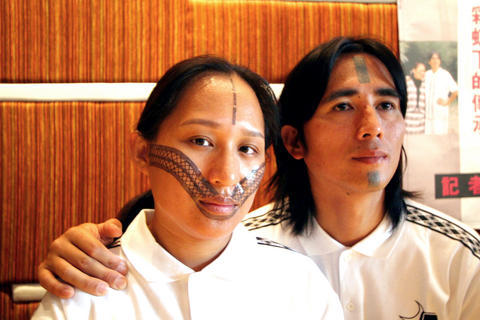A woman from the Atayal tribe in the east has had an elaborate tattoo ingrained on her face, marking the first time an Aboriginal woman in Taiwan has had her face tattooed in nearly a century.
The 33-year-old woman, Shayun Foudu, had the shape of a large "V" tattooed on her face during the weekend at a tourist resort in Taroko National Park in Hualien County.
"Facial tattooing is an old cultural tradition of the Atayal tribe. I feel very proud to have a tattoo on my face," Shayun Foudu told reporters.

PHOTO: CNA
Japanese colonial rulers banned the traditional custom 95 years ago, but the government does not outlaw the practice today. The custom of tattooing faces is believed to date back about 1,400 years and was practiced by several of the nation's Aboriginal tribes.
Foudu said that traditionally, Atayal women would have their faces tattooed after their first period. When a young Atayal man was marrying his young bride, the man would also have his face tattooed as a propitious sign of the couple's wish to have a long-lasting marriage, she said.
Foudu, a native of Fuhsing Township (
The tattoo artist used modern tattooing techniques to put the pigments on Foudu's face. The process took two hours. In old days, tattooing was done with needles, with ashes applied to the wounds, in a painful process.
Facial tattooing had also been a tradition of other indigenous groups, including the Amis, but Atayal tattoos are especially well-known, partly because it was widely practiced and the tattoos covered practically the entire face.
Specialists say the practice was used for several purposes, including as a way for Atayal ancestors to identify and protect later generations. Tattoos also served as marks of honor for men who were skilled in headhunting, while in women they represented the attainment of skills such as weaving.
The tradition is rapidly disappearing, however, and some Atayals are trying to record the history of face tattooing before the older generation dies.
Foudu said she hopes her and her husband's actions will help society adopt an open mind about facial tattoos.

Several Chinese Nationalist Party (KMT) officials including Chairman Eric Chu (朱立倫) are to be summoned for questioning and then transferred to prosecutors for holding an illegal assembly in Taipei last night, the Taipei Police said today. Chu and two others hosted an illegal assembly and are to be requested to explain their actions, the Taipei City Police Department's Zhongzheng (中正) First Precinct said, referring to a protest held after Huang Lu Chin-ju (黃呂錦茹), KMT Taipei's chapter director, and several other KMT staffers were questioned for alleged signature forgery in recall petitions against Democratic Progressive Party (DPP) legislators. Taipei prosecutors had filed

Taiwan would welcome the return of Honduras as a diplomatic ally if its next president decides to make such a move, Minister of Foreign Affairs Lin Chia-lung (林佳龍) said yesterday. “Of course, we would welcome Honduras if they want to restore diplomatic ties with Taiwan after their elections,” Lin said at a meeting of the legislature’s Foreign Affairs and National Defense Committee, when asked to comment on statements made by two of the three Honduran presidential candidates during the presidential campaign in the Central American country. Taiwan is paying close attention to the region as a whole in the wake of a

NEW WORLD: Taiwan is pursuing innovative approaches to international relations through economics, trade and values-based diplomacy, the foreign minister said Taiwan would implement a “three-chain strategy” that promotes democratic values in response to US tariffs, Minister of Foreign Affairs Lin Chia-lung (林佳龍) said. Taiwan would aim to create a “global democratic value chain,” seek to capitalize on its position within the first island chain and promote a “non-red supply chain,” Lin was quoted as saying in the ministry’s written report to the Legislative Yuan submitted ahead of the legislature’s Foreign Affairs and National Defense Committee meeting slated for today. The Ministry would also uphold a spirit of mutual beneficial collaboration, maintaining close communication and consultations with Washington to show that Taiwan-US cooperation

Taiwan and the US have begun trade negotiations over tariffs imposed by US President Donald Trump earlier this month, Minister of Foreign Affairs Lin Chia-lung (林佳龍) said in an interview this morning before reporting to the Legislative Yuan’s Foreign Affairs and National Defense Committee. The Taipei Economic and Cultural Representative Office (TECRO), Taiwan’s de facto embassy in the US, has already established communication channels with the US Department of State and the US Trade Representative (USTR), and is engaging in intensive consultations, he said. Points of negotiation include tariffs, non-tariff trade barriers and issues related to investment, procurement and export controls, he